
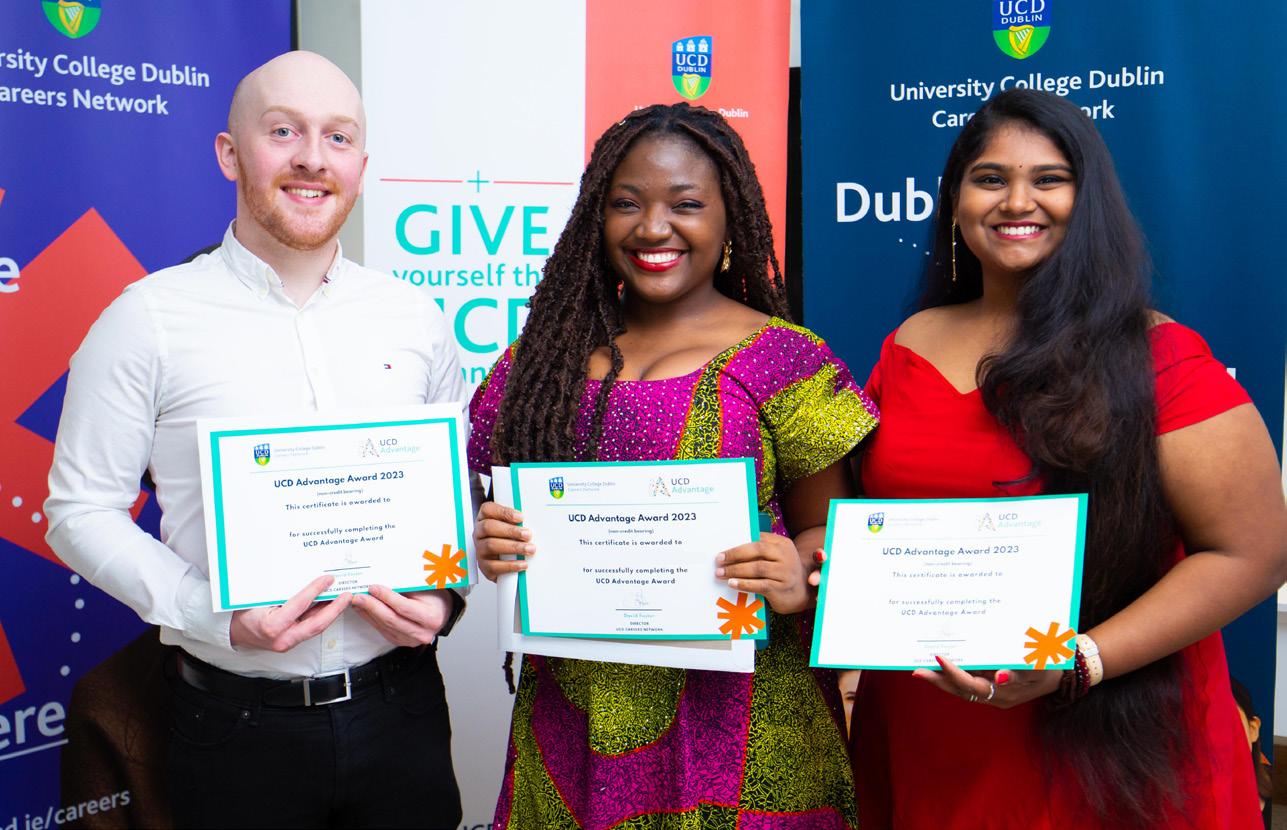



100% of students would recommend UCD Advantage to a friend
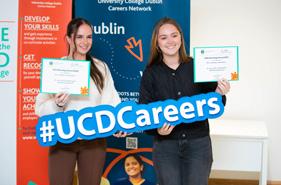
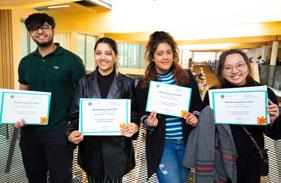
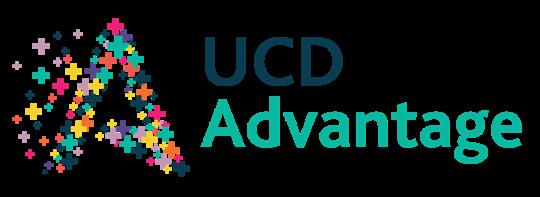
The UCD Advantage Award is your chance to get recognition from UCD for skills, knowledge and experience that you have gained through participation in co-curricular activities. Whether you are a part of a UCD Society or sports team, volunteer your time with a charity or have done a summer internship, UCD wants to acknowledge your contribution and development.
UCD students involved in co-curricular activities can apply. Your activities can range from clubs, societies, volunteering, internships, part-time work and hundreds more.
Completing the award helps you to articulate all the amazing transferable skills you have developed. Employers are looking for well-rounded students and UCD Advantage will help you stand out from the crowd. A great addition to your CV!
Pre-register for the UCD Advantage Award on SISweb at any point during your time at UCD.


UCD Careers Network sets out to offer services to all students at UCD to enable them to consider and plan their future career. We do this in many different ways, for example, by offering career consultations, credit bearing modules in career development, non-credit bearing programmes and Awards such as the UCD Advantage and a sophisticated online platform called MyCareer, packed full of information, job vacancies, e-learning and AI assisted CV development and online practice job interviews. This guide illustrates one approach taken by your team of expert Career Practitioners at UCD Careers Network to bring to you a comprehensive career toolkit. Please use this career guide in conjunction with MyCareer which you will find at www.ucd.ie/careers
– DR. DAVID FOSTER, UCD DIRECTOR OF CAREERS, EMPLOYABILITY & SKILLS AND ASSOCIATE EDITOR OF THE BRITISH JOURNAL OF GUIDANCE AND COUNSELLING
At the front of this guide you will find information on how we can support you during your time at UCD and beyond. You will also find information and advice to help you successfully navigate the employment market, including how to get started on your career planning and how to make great job applications.
The second half of the guide has been tailored to the needs of students of your College. We will provide you with insights into the employment market, in addition to advice on building and articulating the key skills that employers look for in graduates. We’ll outline the career and employability supports available within your College and through a series of short profiles, showcase the great things that students and graduates of your College have been doing to progress along their chosen career paths.
We want this guide to be practical and suited to your needs, and maybe a source of inspiration and ideas.
As always, we would love to hear your feedback as we strive to continually improve our service, so if you have any feedback on this year’s guide or any suggestions for what we should include next year please drop us an email at: careers@ucd.ie
OK, let's start!
In addition to the supports and services provided by UCD Careers Network, gradireland.com is a source of helpful information and resources to assist you in your career planning.
It has been developed collaboratively by a range of organisations including the Association of Higher Education Careers Services (AHECS), as well as universities across Ireland and the UK.

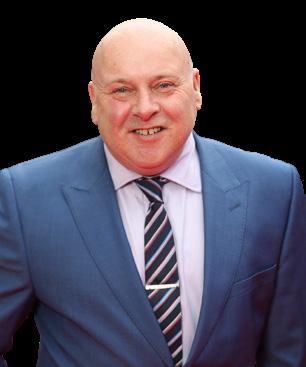
Dr. David Foster
UCD Director of Careers, Employability and Skills
Associate Editor of the British Journal of Guidance and Counselling
The team at UCD Careers Network is committed to enabling students, recent graduates and Postdoctoral Researchers to plan and achieve career success and prepare for life after university. There can be no doubt that the workplace is changing at a pace not seen before with AI transforming our thinking, workplaces and life more generally. The World Economic Forum in its report entitled “The Future of Jobs Report, 2025” indicated that 85% of the employers surveyed planned to prioritise upskilling their workforce, with 70% expecting to hire staff with new skills, 40% planning to reduce staff as their skills become less relevant, and 50% planning to transition staff from declining to growing roles. The result is that today’s graduates more than ever before, need a “can do”, “can adapt” attitude with reskilling and upskilling set to become the norm for those active in the workforce. UCD Careers Network can help students, across the university prepare for and thrive in work and life after programme completion.
The Graduate Outcomes Survey, 2023 (the last year for which data exists) shows UCD graduates performing well in the jobs market with 79.03% in employment, 13% in Further Study and Training, 6.14% seeking employment and 1.83% not available for employment. While the statistics are encouraging for career success and progression, take time to engage with the services, programmes and co-curricular awards organised by staff at Careers Network to develop your career and self-awareness, skills, attributes, and opportunities to meet leading employers of interns and graduates.
While the world will never stop changing, with thought and by making use of resources available at UCD, you will succeed and hopefully, stay connected to UCD though our Alumni associations.

Leonie Phipps Career & Skills Consultant
As the Career & Skills Consultant for the Undergraduate School of Business, I am delighted to introduce you to the many initiatives that the UCD Careers Network has to offer for the College of Business Students to enhance your employability skills during your time in UCD.
Having worked in a business environment myself, I understand the skills and attributes that employers are looking for when hiring graduates. Prior to joining UCD I worked in recruitment and HR roles in multinational technology companies where I have managed graduate and internship hiring programmes. Having always had a passion for coaching and developing people, I decided to move into the career guidance area 2 years ago and I can honestly say this is the most rewarding job I have had so far!
In my role, I am focused on empowering students to make the right career choices and to ensure you receive the support to enable you to develop you in your career. As well as providing one to one guidance meetings, I deliver workshops in the Quinn School and these are promoted on MyCareer and our social media channels!
This guide offers insightful information for business students on topics such the graduate employment market, the benefits of doing an internship and how to secure a graduate role.

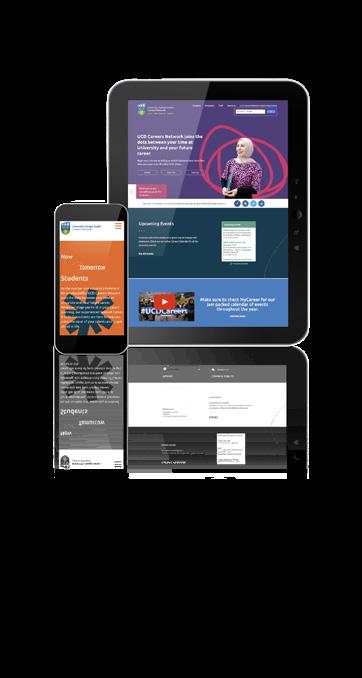
Take a look at our website www.ucd.ie/careers/ We hope you like it!

As the number one university in Ireland for employability, UCD Careers Network joins the dots between your time at university and your future career. Whatever stage you’re at in your career, our experienced team of Career and Skills Consultants are here to help you make the most of your talents and to help you get ahead. Whether you’re an undergraduate or graduate student, it’s never too early to ask for help. We can help you to discover more about yourself, navigate the complex job market and introduce you to employers through our extensive network.


MyCareer is a content-rich careers management platform featuring interactive tools, e-learning content and the latest job opportunities. It is designed to help you navigate today's job market and move your career forward with confidence.
This online career management platform is also your one-stop-shop for events, career information and 1-2-1 career appointments. You can access MyCareer via UCD Connect or the UCD Careers Network website.
“Very helpful, friendly and welcoming staff."
"Highly professional, focused and informed service."
"Wonderful service and very beneficial to students. Informative, approachable and helpful. True advocates of students."
"Excellent service...helped me make a plan in 5 minutes, priortising my goals. This was an extremely reassuring process for a nervous final year student."
"Really helpful and insightful, making the application process more accessible."
Are you confused about the career paths available to you after graduation? Get inspired with MyCareer’s ‘Exploring Careers with My Degree’!
A new set of resources are now available on MyCareer to help you explore career pathways specific to your college and degree. These custom school pages have been developed by our expert Career Consultant team for each of UCD’s six colleges - including tailored content for your degree.
Whether you’re just starting to consider your options or actively planning your next steps, this is your go-to guide for discovering where your degree can take you.
Each page is packed with degree-specific content to help you navigate career planning. From career path overviews and real job profiles to alumni insights, networking opportunities, and targeted career support on offer, you’ll find everything you need in one place. Simply log into MyCareer, go to the Career Exploration tab, choose ‘Exploring Careers with my Degree’ from the dropdown menu and select your college and school to start exploring careers today.
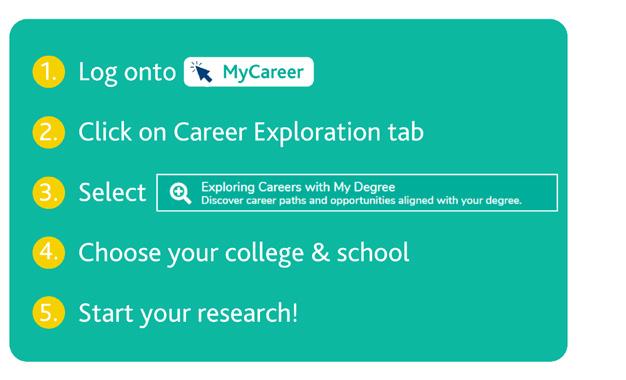

CV360 scores your CV against more than 50 checks that commonly annoy a hiring manager. You get instant, detailed feedback so you can optimise your CV and significantly boost your chances of getting to interview stage.
Interview360 features a range of mock interviews you can take to really test your ability to come up with strong, confident, well-thought-through answers under time pressure. You’ll get instant feedback and advice, and every question you answer will make you a stronger candidate.
There's a huge range of resources on our MyCareer platform, so if you're not sure where to start, take the CareerEDGE+ profile quiz. CareerEDGE+ is a personal development tool that should help you to identify possible areas for development over the next year.
Whether you are beginning your career, have many years of experience or are unsure of your career direction, reflecting on your motivations, preferences, values and working style can be useful when considering your current role and desired career path. MyCareer hosts a wide range of assessments including Personality Insight, Motivation at Work, Management Skills and Strengths. The assessments take 10-15 minutes each to complete. At the end of each assessment you can access your personal report, with practical, tailored, recommendations to apply to the workplace.

Whether you have no plan, some plan or a clear plan, we can help you figure out the next steps. Check out the interactive career planning tool on our website for tailored tips and advice. If you would like to speak to a Career and Skills Consultant, sign up for a 20 minute career coaching session via MyCareer.
Our Career and Skills Consultants deliver a range of engaging and interactive modules, workshops and seminars for students across all disciplines and stages. These cover everything from developing a stand-out CV or perfecting your interview techniques to developing the key skills that graduate employers are seeking, like leadership, teamwork, presentation skills, commercial awareness etc. Check with your Programme Office to find out about bespoke career development and employability support in your area or contact your Career and Skills Consultant
We advertise thousands of graduate and internship opportunities. Check out the vacancy portal on MyCareer and follow us on Facebook, Twitter, LinkedIn or Instagram to get up to date notifications of exciting new opportunities. If you are considering an internship in the USA, we’ve also got you covered! Check out our comprehensive database of US internship opportunities; CEI Internships.
We will be holding our usual recruitment fairs; Business Finance & Management; Science, Engineering & Technology; Law and Internship. We'll also hold a range of recruitment events featuring the top graduate employers and insightful sectorbased panel discussions. With employers from across all sectors, there really is something for everyone and countless opportunities to connect and grow your network.
We are active across a range of social media platforms. We use these to promote opportunities and events and generally keep you up to speed on all things careers and employability related. Follow us to stay in the loop. In addition to helping you connect with employers, we also work to ensure you are well-prepared to bag that internship or graduate job. Get your CV and cover letter in shape by using the tools and resources on MyCareer and then have one of our team look over them at a 1-2-1 consultation. Attend an interview skills workshop, practice your interview performance and get valuable personal feedback.
We know that getting started can be stressful and taking those first steps can be daunting. Rest assured that you are not the only one who is unsure about what to do next and we are here to help you move forward from wherever you are currently.
It’s never too soon to engage with us – whether you are in first year or final year, the sooner you make contact, the more we can do to help.
We have developed an interactive career planning tool, aimed at helping you move forward. All you need to do is think about where you are currently in relation to career readiness – do you have no idea what you want to do or how to go about it? Or do you have some ideas but there are gaps you need help filling in or maybe you are very clear on what you want but would value a sounding board.
Wherever you are at right now, just go to the Careers Network website, choose the option that best reflects your current state of career readiness (No Plan, Some Plan, Clear Plan) and you will receive a set of tailored suggestions for supports, resources and activities that can help you move forward.
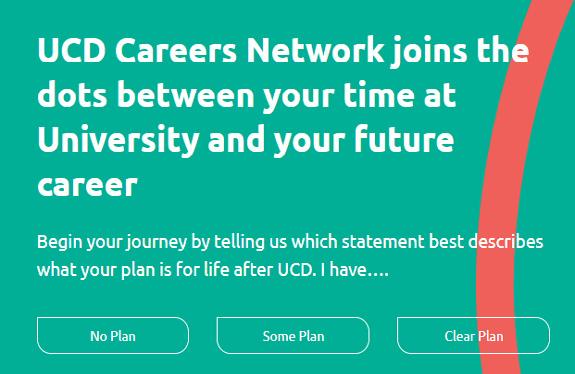

We know you are busy and there is a LOT happening, particularly in trimester 1...BUT here are a few key dates for your diary. Please note that these are the highlights - for the full event listings, including details of times, venues and registration information, make sure you check out MyCareer. New events are being added to our MyCareer calendar all the time, so don’t miss out!
UCD Careers Network Open Day – 17th September 2025
Meet the team and find out all the ways we can help you during your time at UCD, and beyond! We have a range of activities and competitions planned on our Instagram page. Follow us here!
UCD Science, Engineering & Technology Fair – 29th September 2025
This fair is about all things STEM, from IT to Pharma to Engineering Project Management. If you are interested in a Science, Engineering or Technology related career, sign up on MyCareer today!
UCD Business, Finance & Management Fair – 30th September 2025
This fair is for anyone who is interested in a career in Business, Finance, HR, Marketing, Management, Accounting, etc. Top graduate employers are interested in meeting students across all academic disciplines, so whether you are studying Ag. Science or Arts (or anything else) come along to find out about the exciting opportunities on offer.
UCD Law Fair – Wednesday 1st October 2025
Did you know that Law firms recruit students from across all academic disciplines? You don’t need to be studying Law to pursue a career in Law. Meet some of the top Law firms in Ireland, the UK and further afield. Join on the day to see if a career in Law is right for you.
UCD Michael Smurfit Graduate Business School Career & Internship Fair –Tuesday 21st October 2025
If you are a Smurfit student who is interested in working in Accountancy or Consulting this is the event for you!
UCD Internship Fair – 21st January 2026
Internships are a fantastic way to gain work experience and find out whether a particular company or sector is right for you. Lots of UCD programmes have built-in academic internships but lots of students also do summer internships. Join to meet employers, across a variety of sectors who have exciting summer opportunities on offer.
Student Orientation Week & Freshers Week – 3rd - 5th September 2025
If you are new to UCD, Orientation week is a great time to find out all you need to know. Keep an eye on our social media pages for events popping up over the week!
Essential Career Skills – Trimester 1 2025
Essential Career Skill workshops are a great way for you to get started on your career journey. These short workshops take you through: Career supports that are available to you at UCD and how to use them; Ways to build your skills; Setting up a LinkedIn profile; What to include on a CV/Cover Letter; How to prepare for an interview.
Future Skills Programme – Trimester 2 2026
The Future Skills Programme is an 8 week programme of employer-led, interactive workshops, covering topics ranging from resilience to technological literacy - based on the key skills employers have identified as being crucial to success (World Economic Future of Jobs Report, 2023). On completion of the programme, including a related reflective assignment, you will be awarded a certificate of completion – another great achievement to add to your CV!
Leadership
• Chairing a student society or a committee
• Captaining a sports team
• Taking responsibility for organising an event
• Being a team leader at work Initiative
• Writing your own blog
• Finding creative ways to raise funds as a volunteer
• Participating in student competitions
Adaptability & Flexibility
• Combining study and part-time work
• Travelling or studying abroad independently
• Managing multiple extra-curricular activities
Teamwork
• Actively participating in student projects
• Commitment to a team-based sporting activity
• Ability to work with others successfully in your part-time job
How can you develop your skills? If you are not sure where to start, check out the Core Skills Courses on MyCareer. It is important to begin building experiences and skills to complement the skills you are developing in your degree.
Planning & Organisation
• Arranging travel itineraries
• Managing competing demands on your time – studies, part-time work and other commitments
• Organising fundraising and other events
Problem Solving
• Overcoming obstacles to achieve a personal goal
• Finding creative solutions to workplace problems
• Participating in student problem-solving competitions
Commercial Awareness
• Keeping up to date with business papers, magazines and social media activity for businesses you're interested in
• Joining relevant student societies e.g. Investors & Entrepreneurs Society
• Learning about the business in your part-time job
Oral Communication
• Giving presentations as part of your course
• Becoming a UCD Peer Mentor or Student Ambassador
• Running a meeting or event
• Dealing with customers via your part-time work
There are ample opportunities at UCD to develop skills through involvement in clubs, societies, work experience, mentoring and volunteering. You can also use your co-curricular activity as the basis for an application for the UCD Advantage Award.


Stand out from the crowd
At the Careers Network, we meet lots of students who are doing great things but struggle to articulate the development they have gained. For example, you may be a great Peer mentor, Class Rep or Student Ambassador but you don't know how to communicate the value of this to a potential employer in your CV or at an interview? If this is something you struggle with, then check out the UCD Advantage Award.
UCD Advantage formally recognises the skills, knowledge and experience that UCD students gain through participation in co-curricular activities, on and off-campus. Participation will encourage you to expand the breadth of your co-curricular activity and get involved in things that you may not have considered previously. This can open up a world of opportunity in terms of meeting new people, experiencing new situations and developing a whole host of new skills. Crucially, it will also help you to effectively articulate your skills, attributes and experience, in applications and at interviews.
Recipients of the UCD Advantage Award will be presented with a digital certificate once their application is approved. The digital certificate can be added to their LinkedIn profile and CV. The physical certificate will be awarded to the achievers at a felicitation ceremony and the UCD Advantage Award will appear on their Diploma Supplement at graduation. The Advantage Award can be listed in the “Achievements'' section of the CV.
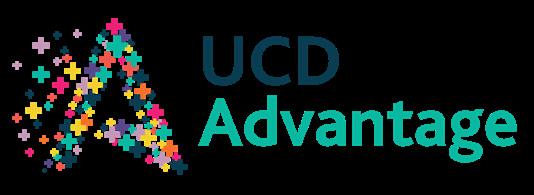
100% of students would recommend the UCD Advantage Award to fellow students. You can register for UCD Advantage at any time, quickly and easily via SISWeb. For more information go to: www.ucd.ie/careers/advantage
Here’s what Advantage Award Achievers have to say about the experience.

Ada Ruohonen, BSc Politics and International Relations and Philosophy,
"The UCD Advantage Award was a great way to look back on my experiences and reflect on the transferable skills I had learned by taking part in these activities. It also allowed me to understand what future employers might be looking for when applying for a new job. Overall, the award was a great way to think about my achievements and be proud of myself! Advice for Students: I would absolutely recommend taking part in the UCD Advantage Award. It is a wonderful opportunity to get recognition for tasks that might otherwise go unnoticed. Besides, it is a great way to come to realise how much you have learned by taking part in extracurricular activities, and how they have been incredibly beneficial in improving your transferable skills for the future. Overall, it is absolutely worth the effort!"

Richard Otroshchenko, BA Economics
"Having an incentive to seriously reflect on my experiences was the most valuable part of the award. I was able to put into words how my involvement in UCD helped develop both my personal and professional skills. I believe that my ability to clearly express all the challenges I faced as Class Rep was a key contributor to me securing an internship for the Summer. Advice for Students: I would absolutely recommend the UCD Advantage Award to anyone who wishes to stand out from the crowd when searching for internships.Additionally, my activities have also allowed me to make new friends and experience new things. Just don’t feel restricted to doing only two activities; there’s every reason to get involved in as many things as you’d like!"
1004 students achieved the Advantage Award in the academic year 2024/2025.
It’s likely that for many of you, the working environment you enter upon graduation will be entirely different to the environment that existed when you entered university. In the space of a few years, the world of work has changed rapidly, without precedent. The pandemic accelerated recent trends in remote working, AI, MedTech, e-commerce, automation and edtech. According to the Professional Services Firm PwC, “today we are living in an era of fundamental transformation in the way we work.”
Not since the Industrial Revolution have organisations had to think about where, when, and how employees undertake their roles.
The concept of a five-day, 40-hour work week at a fixed location is nearly a century old. It was invented by Henry Ford in 1926 to serve manufacturing plant assembly lines. It’s possible that the working environment you enter will still be in a state of flux as organisations and entire sectors continue to adopt new ways of working such as remote, hybrid, flexible working, or agile working practices.

One of the most important skills you will need is adaptability. It is essential for navigating the changes ahead. It’s impossible to entirely predict exactly the skills that will be needed even five years from now, so organisations and employees need to be ready and able to adapt to rapidly changing patterns of work, working structures, use of technologies and AI as well as the impact of geo-politics and climate change.


Some of the below terms are now widely used in job advertisements for internship or graduate roles so be sure you have a clear understanding of the company work practices before applying. Check out the list below to familiarise yourself with these terms.
A remote employee is someone who is employed by a company but works outside of a traditional office environment. This could mean working from a local coworking space or from a home office.
A hybrid working model is when an employee works part of their time in the workplace provided by their employer and part of their time from home or anywhere else other than the normal place of work. Also referred to as e-working or flexible working.
Agile working is a way of working in which an organisation empowers its people to work where, when, and how they choose. It is generally agreed with your line manager and may differ across teams in an organisation.
Here are our top five tips for putting together an impactful application:
1. Start by analysing the job advert so that you have an in-depth understanding of the recruiter’s requirements.
2. Always tailor your CV to show that you meet the employer’s needs by matching your skills and experience to their stated requirements.
3. Prove that you are a strong candidate by giving examples of your skills and achievements.
4. When assessing the content of your CV ask yourself ‘so what?’ after each statement. If it isn’t really saying anything or is not relevant, does it have a place on your CV?
5. Don’t cut corners when it comes to your cover letter. This is an important part of your application as it allows you to demonstrate your particular interest in the organisation and role, and shows that you’ve done your research!
Your CV and cover letter or your online application form are your sales and marketing tools. The quality of your application determines whether or not you get an interview. This is your opportunity to highlight your strengths, skills and experience to a potential employer and set out what makes you a great fit for the role. Tailoring your CV, cover letter or application to the requirements of the role is critical – a “one size fits all” approach won’t do you any favours.
Reviewing the e-learning content 'CVs and Applications' on MyCareer is a great way to get started. It will quickly bring you up to speed on the essentials of putting an impactful CV and cover letter together. You can also attend one of our effective applications workshops. Check with your Career & Skills Consultant to see if there's one scheduled for your particular programme.
When you have a draft you are reasonably happy with, use the CV360 tool on MyCareer to receive instant feedback and advice to improve your CV. If you need further support tailoring your application, you can book a 1-2-1 consultation and get some expert advice and feedback from one of the team.
Your cover letter should be in formal letter format and no more than one page in length. It should address the following points:
• Introduction/why you are writing
• Summary of your key skills and experience relative to the role (this should compliment what's in your CV, not repeat it verbatim). Outline why you are a great fit.
• Why you want this job or to work for the company? Show your enthusiasm and demonstrate that you have done your research.
• Closing/sign off

Heading
Personal Profile
Summary (optional)
Education
Work
Experience
Skills Section (optional)
Interests & Achievements
References
Final Checks
• Does your name appear in bold at the top of the page (not the words; Curriculum Vitae)?
• Are your contact details, including phone number and email address, clearly visible under your name?
• Is it concise, tailored and relevant to the specific role you are applying?
• Is it specific and evidence-based as opposed to generic or clichéd?
• Have you clearly stated your qualification titles, institutions attended and start and end dates?
• Have you included your current GPA/expected award classification?
• Have you included a select number of the modules most relevant to the specific role?
• Have you mentioned any project you have completed that is relevant to the specific role?
• Have you listed your most recent qualifications, before listing older qualifications e.g., your Leaving Certificate?
• Have you clearly stated the job title, company/organisation name and stated start and end dates?
• Have you outlined your key responsibilities (not a task list) and achievements using bullet points?
• Does each bullet point start with a strong action verb and give specific details, including metrics where possible?
• Have you clearly articulated skills and experiences relevant to the role you are applying for?
• Have you listed your most recent job first and then worked back?
• Have you included only skills that are relevant to the role you are applying to?
• Have you backed up your claims with specific evidence and examples?
• Do you provide specific information where possible e.g., levels of language proficiency, IT software packages, coding languages, etc.?
• Do the interests/achievements included demonstrate relevant transferable skills?
• Have you included relevant voluntary work, society memberships or sports teams?
• Have you included membership of any professional bodies or relevant organisations?
• Have you either stated “References available upon request” OR given referees’ names, job titles and contact details?
• If you have given referees, is one an employer and one an academic lecturer?
• Is your CV 2 pages or less?
• Is it easy to read e.g. font size 11 or 12, with clear headings and subheadings?
• Have you used bullet points instead of paragraphs?
• Have you avoided generic statements and instead used specific examples to support claims?
• Have you had someone else proof-read it?
If you are invited to interview it means that ‘on paper’ you seem like a good fit for the role and the employer would like to validate this by finding out a bit more about you. An interview also provides you with the opportunity to evaluate whether the organisation and role are right for you.
Preparation is essential. The more prepared you are, the more confident you will feel. Be sure to research the job and the organisation thoroughly, using resources such as the company website, annual reports, LinkedIn, Google News search etc. Try to anticipate the questions you might be asked, especially about the skills and experience needed; how you will respond to these and what evidence you can provide to convey your suitability. Prepare examples to demonstrate your key strengths and competencies.
Find out who will be interviewing you, how long the interview will last, and whether there will be any tests or other selection methods. Before the interview, review your CV or application so you’re clear on what you wrote and are ready to discuss it in more detail. Make sure to check the ‘Interviews’ e-learning on MyCareer for practical tips, important dos and don'ts, and advice on handling different interview types so you can put your best foot forward.
Interview360 features a range of mock interviews you can take to really test your ability to come up with strong, confident, well-thought-through answers under time pressure. You’ll get instant feedback and advice, and every question you answer will make you a stronger candidate.
Dress for success: Even if the workplace is casual, wear professional attire.
Breathe: It’s normal to feel nervous. Try deep breathing exercises to calm yourself.
Greet confidently: Smile, offer a firm handshake, and maintain good eye contact. Show energy and enthusiasm.
Listen carefully: Don’t be afraid to ask for clarification on any of the questions asked.
Watch your body Sit up straight and maintain good posture. language:
Stay calm: Take a moment to think and compose yourself before answering tricky questions.
Prepare questions: Have a couple ready to ask the interviewer at the end to show your interest in the company and role.

Many interviews are now competency-based. These questions ask you for specific examples that demonstrate key skills such as teamwork, problemsolving, commercial awareness, or leadership. They often take the form of:
• “Tell me about a time when you worked effectively as part of a team.”
• “Give me an example of a challenging problem you solved.”
• “Have you ever led a project? Tell me about that experience.”
When faced with these questions, remember:
1) Use a specific example. Don’t talk about what you would do or usually do. Prepare a set of examples that clearly show the competencies the employer is looking for.
2) Use ‘I’ rather than ‘We’. Saying “We did xyz” makes it unclear what you actually did. The interviewer needs to see your personal contribution, so use the first person.
3) Use the STAR approach (Situation, Task, Action, Result). This helps you answer clearly and with structure.
- Situation: Give brief context and background so the interviewer understands your example.
- Task: Describe your role or what was required of you, keeping it concise.
- Action: Focus on this part. Explain in a logical, structured way the steps you took to achieve the goal. Use “I”.
- Result: Share the outcome. Aim for positive results that show your impact. You can also mention what you learned and how you'd apply it in the future.
Using these tips will help you deliver clear, strong answers that demonstrate the skills employers want to see.
Over one third of UCD students maintain part-time work alongside their degree. Part- time work can be very useful, for generating income for yourself - as well as building transferable skills.
Consider what hours you can work, be realistic about how much time you can offer that won’t affect your studies. International students should also ensure they understand how many hours a week they are entitled to work.
Narrow down the sectors you will prioritise in your search by considering the transferable skills you may gain from different types of part time jobs. This could range from e.g. developing commercial awareness through retail work, customer service skills through hospitality, administrative or IT skills through office based work or customer support.
To get started, there are a number of websites you can visit:
• UCD Students Union Job Board - advertising on and off campus part time work
• MyCareer Vacancy Portal - advertising graduate, internship and part time roles (filter by PT Work)
• UCD Careers Networking LinkedIn Newsletter – Subscribe to keep up to date on opportunities for UCD students
• LinkedIn Jobs – filter by part time/entry level
• Indeed, Jobs.ie, Monster.ie - national jobs boards with PT filters
• Work At UCD Job Board - mainly advertising full time roles within UCD, but can occasionally also advertise contract and part time opportunities
Consider going directly to employers who are not advertising. It can be simplest to print a copy of your CV and just walk in with it (when they aren’t busy). Use your network to find out about opportunities that may not be advertised. Consider applying to roles based on the UCD campus. For hospitality work, there are over twenty coffee shops and restaurants on campus.
There are some paid campus leadership roles that may offer a small number of regular hours: UCD Residential Assistants, Student Library Guides, UCD Global Guides, UCD Career Ambassadors, UCD Student Ambassadors, UCD Science Student Leader, and UCD Access Student Leaders.
Some Schools offices have Research Assistant roles available for suitable students. Similarly tutor roles within the UCD Writing Centre, the UCD Maths Support Centre or the UCD Computer Science Centre may be a fit for students with specific skill in these areas, such as PHD students.
Edit your CV specifically for part time roles. Include a brief profile at the top outlining your availability, relevant skills or experience.
For more information on CV’s, check out our CV resources on MyCareer including CV360 to get instant feedback on your CV, and then book a 20 minute appointment with our Career Consultants to have your CV reviewed.
Did you know you can book an appointment with UCD Careers Network to have your LinkedIn profile reviewed?
The average social media user spends 2+ hours per day across social media applications. Imagine if you could use even 10% of this time to enhance your career journey, with little effort. Well, you can take the next steps…
First steps…
• Follow companies or accounts of interest on LinkedIn, Facebook, Instagram, Twitter & YouTube.
• Follow services that can support your career development such as; UCD Careers Network, GradIreland, NextStepSupport and Prospects.
• Make sure your own social media profiles are ready to be viewed by a potential employer. If not, consider keeping them private.
• Join LinkedIn and update your profile to reflect your CV.
• Connect with your in-person network on LinkedIn, including classmates, colleagues, and friends.
Next steps...
• Follow company social media accounts to hear about their updates, products, projects and upcoming opportunities. As you scroll, you’ll be picking up nuggets of information that will help you learn more about the company and sector.
• Save posts that you find particularly interesting. You can revisit these when preparing a future application, to be easily reminded of recent company news or anything that captured your interest.
• Connect or follow people who are working in roles that interest you. You’ll get a sneak peek into their daily working life and a better idea of whether it could be the right path for you. ‘Virtual’ work shadowing could be just a tap away! @dr_niamh_shaw, @drsarahjmurphy, @pintofscienceie to name but a few!
• Subscribe to YouTube accounts that are using their platform to educate, such as Science Foundation Ireland, Engineers Ireland, RIAI (Architecture), National Gallery of Ireland and Creative Careers
• On social media, follow hashtags. Keep an eye on #IrishJobFairy for part-time roles. If you’re interested in design follow #AdobeIllustrator or studying Agricultural Science, then why not follow #Agriculture?
• Share your passion. If you could be the next Mary Berry or Joe Wicks, why not use your social media to showcase your talent or passion? This could be a brilliant example of your communication skills to talk about on your CV or during your next interview! You could also take Google’s free Digital Garage course on digital marketing to learn how to build your own personal brand.
• Share your work and professional development on LinkedIn. Whether it’s a certificate you’ve earned or you’ve taught yourself how to use new software, be sure to let your connections know.
Remember…
• Don’t spam people, always be polite and provide a personal message providing context when connecting with alumni or employers.
• Check your privacy settings, make sure you’re aware of just how much a potential employer could see with a quick google search!
• Be mindful that everything you post online could stay there forever. Think before you post or endorse.

Final Checks
• Have you included a head and shoulders photo of yourself, posed against a plain background?
• Are you smiling, looking at the camera and dressed professionally?
• Are you the only person in the photo?
• Does your headline correctly reflect your current situation (e.g. Final Year Computer Science Student & Aspiring Research Analyst)?
• Have you included a brief summary written in the first person, highlighting your key strengths and motivations?
• If you are targeting a specific sector, have you included your goals and tailored your summary to this sector?
• Have you included any additional training or certifications (e.g. Certificate in Project Management) that are relevant to the sector you have chosen to work in?
• Have you listed your most recent qualification first, before listing older qualifications?
• Have you clearly stated your qualification titles, institutions attended & start and end dates?
• Have you listed the modules completed that you think would be of most relevance to the sector you wish to work in?
• Have you mentioned any activities or societies you are engaged with in University?
• Have you listed your most recent job first and then worked back?
• Have you clearly stated the job title, organisation name & start and end dates?
• Have you outlined your responsibilities and achievements using bullet points?
• Does each bullet point start with a strong action verb and contain specific details (e.g. numbers, software used, outcomes)?
• Have you included details of any volunteering roles you have participated in?
• Have you listed at least 5 skills, which your connections can endorse you for?
• Have you searched job descriptions of interest to identify key skills to be included?
• Have you requested a recommendation from a previous employer (if available)?
• Have you included any organisations you are part of?
• Have you listed any honours or awards you have received?
• Have you included the title of (& if possible, a link to) any relevant projects completed?
• Have you listed any additional languages you speak?
• Have you added your job preferences?
• Have you added links to any relevant examples of your work e.g. pdfs of abstracts, projects on websites such as GitHub, writing samples from your blog, images of design work from Instagram etc.?
• Have you claimed your personal URL by clicking “edit public profile and URL” in the upper righthand corner of your profile?
• Have you reviewed the LinkedIn Profiles of people in roles of interest to you, to better tailor your own?
• Have you had someone else review your profile?
Graduates of the UCD College of Business are employed in both public and private sectors, across a wide range of industries, from professional service, to start ups and technology companies.

What do employers look for in business graduates?
• Communication
• Problem-solving
• Research
• Negotiation
• Commercial Awareness
• Creativity
• Organisation & Time Management
• Analytics
• Leadership
• Teamwork
• Initiative & Drive
• Entrepreneurial Flair
Graduates of the UCD College of Business are employed in both public and private sectors in a wide range of industries, from professional services, to start-ups and technology companies. As a Business student studying in UCD you will develop a wide range of skills and knowledge to succeed in a dynamic business environment. Employers value the transferable skills that you possess. Take a look at the list to the left and see which ones you have developed in your course so far.
Data from the annual UCD Graduate Outcomes Survey shows that a significant proportion of UCD Business graduates go to work for professional services and accountancy firms.
Many other Business graduates go to work in Banking or Financial Services. Ireland is the fourth largest financial services provider in the EU, with more than 400 international financial institutions. Ireland has become

• 42,000 people employed in Financial Services
• 50% of the world's top 50 banks have operations in Ireland
• 4,000 employed in Fintech
• 60+ International funds servicing and trustee/custodian banks in Ireland
(Source: IDA, Enterprise Ireland, FSI)

a leading centre of excellence for a variety of activities ranging from fund administration to aircraft leasing. Fintech is also a rapidly growing industry within this area.
Overall, the employment market for Business graduates is strong at the moment and there are lots of exciting opportunities across a range of sectors. However, competition remains strong and it’s always a good idea to gain as much experience as you can during your time at UCD, through internships and co-curricular activities. Building your skills while at university will help you stand out from the crowd when making applications and doing interviews. Enhance your business skills by doing some skills modules on MyCareer throughout the year.
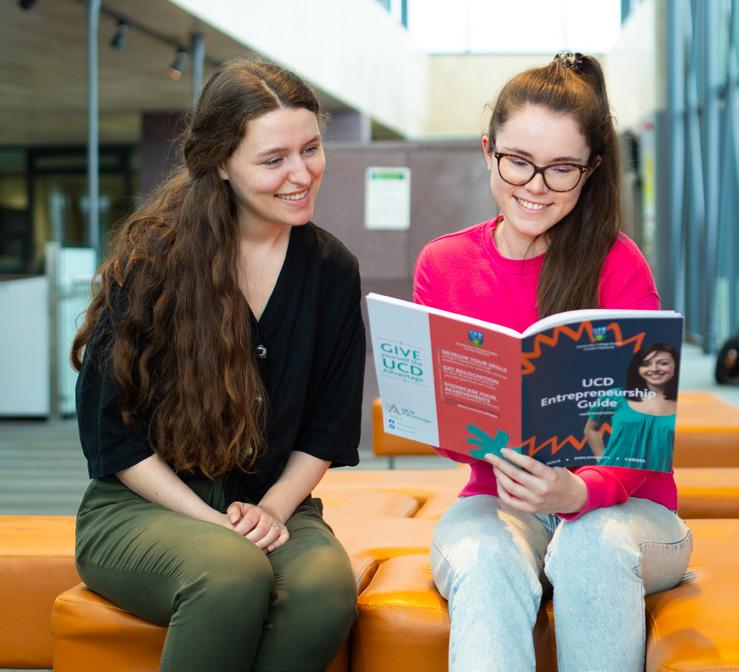
• KPMG
• EY
• Deloitte
• Accenture
• PwC
• Grant Thornton
• Amazon
• AIB
• Meta
"We are consistently impressed by the calibre of UCD students who join Grant Thornton through both our Graduate, Intern and Placement Programmes. These students bring a strong academic foundation, fresh perspectives, and a proactive attitude that adds real value to our teams from day one. Their professionalism, curiosity, and commitment to growth make them a great fit for our collaborative and dynamic environment. We are proud to welcome UCD students and watch them thrive as future leaders in our firm."
Niall Gormley, Campus Recruitment Lead, Grant Thornton Ireland

Want to explore your career interests and options in more detail?
Book your appointment through MyCareer.
Plan
While many UCD Business graduates go to work for accountancy and professional services firms, there are a wide variety of other exciting job opportunities available to you.

UCD Business graduates can compete successfully for roles across a range of organisational functions including:
• Marketing/Advertising/PR
• HR/Recruitment/Training & Development
• Sales/Business Development
• Supply Chain Management
• Business & Data Analytics
• Project Management
• Consultancy
Companies across all sectors including Technology, Pharma and Retail, are seeking graduates to work across all business functions. Companies like Facebook, Indeed and Zendesk have set up their European Headquarters in Dublin.

Why are these large multinational companies investing in Ireland? According to the IDA, Ireland has a well-educated, mobile and ambitious workforce due to the quality of our education system. Ireland is also a breeding ground for lots of new start-ups, many of whom employ graduates in a range of capacities.
Working in a big multinational organisation can give you exposure to projects and initiatives at both a European and Global level. Working for a start-up can give you exposure to a variety of different functions in a fast paced, autonomous environment while learning quickly on the job.
Perhaps a career within the public sector appeals to you? There are many opportunities in Ireland and the EU. Examples of roles include Administrative Officer where you would be developing policies and have managerial responsibilities. Other popular jobs include Diplomat, Researcher, and Teacher. Check out the Public Jobs website for public sector jobs in Ireland and the EPSO website for opportunities in the EU.
For information on sectors/industries where business graduates are working, have a look at the Explore Careers section on MyCareer.
A degree in Business can take you anywhere. However, it can be hard to decide on a career path when there are so many career opportunities available. The Careers Network is here to help.
Doing an internship, getting work experience or work shadowing are great ways to build skills and gain insight into a particular role, organisation or sector. As a Business student, there are also a number of workshops, classes and programmes offered by UCD Careers Network that you can participate in. These are tailored to the specific needs of your academic stage and programme and specifically designed to help you develop employability skills and learn more about career action planning. So, make sure you attend! Keep an eye on your UCD email and MyCareer for details of upcoming workshops.
For undergraduate Business students, topics that will be covered this year include: ‘what are graduate recruitment programmes’, ‘where to find a summer internship’, ‘spring insight weeks’, ‘how to make an effective job application’, ‘how to succeed at interview’, ‘job searching and networking using LinkedIn’, as well as several sessions for students who plan on doing a 9-12 month academic internship.
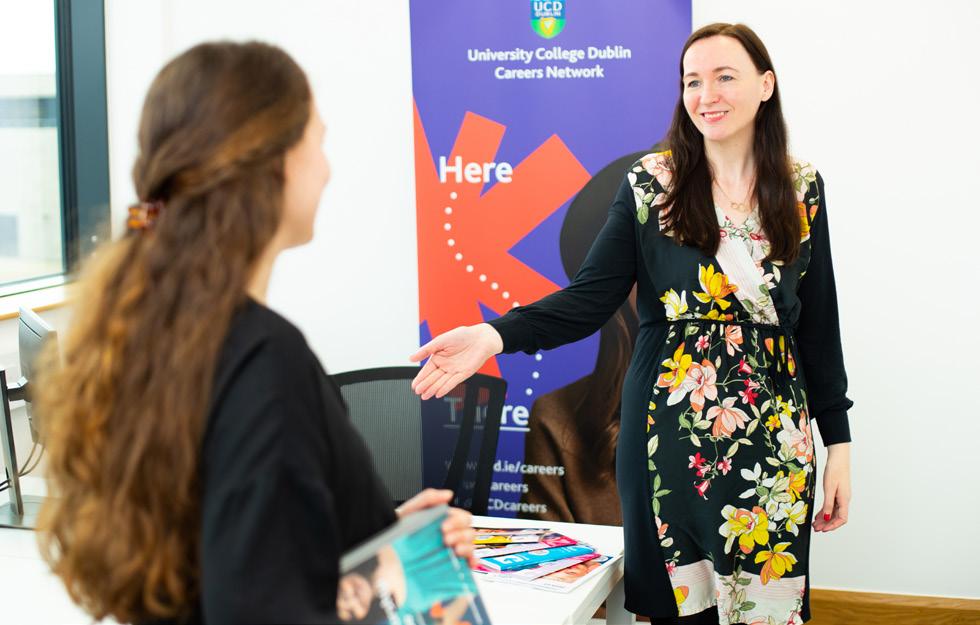


"I’m a Digital Content Executive at Drury Communications, Public Relations.
At Drury, I create video and visual content, manage events, and audit clients’ social media channels to enhance their online presence. I also support influencer marketing by identifying and managing influencer relationships specific to client campaigns. My specialty is Employer Branding, using social media marketing to attract top talent.
Building and managing client relationships is crucial in my role, a skill I honed during my MSc in Marketing at UCD. My master's helped me gain a deep knowledge of traditional and digital marketing. My favourite subject was Consumer Behaviour: it was a blend of psychology and marketing. We were given real-life projects to work on which enhanced my problem-solving and analytical skills.
I worked as a Student Representative for the UCD Smurfit Careers Network where I helped organise career fairs and created videos for LinkedIn, which laid the foundation for my Employer Branding skills.
I recommend incoming students engage fully with career services, apply for roles like Student Career Representative, and utilise CV and interview preparation facilities. Don’t hesitate to ask professors for help. Lastly, don’t forget to have fun and make lovely friends along the way!"

I graduated from the BComm International (German) in 2018 and I’m now pursuing a career in sustainability. After university, I went straight into a graduate programme in Deloitte's strategy consulting team, which was a brilliant entry point into the workforce. My time there exposed me to areas like organisation redesign and business model transformation and allowed me to develop an excellent skillset in project management.
With my own climate consciousness growing stronger, I was curious to explore a more climate-positive career, an interest that had initially arisen when I took the Green Ventures module during my final year at UCD. I began a masters in marketing which allowed me to step into my more creative side and also learn about marketing’s potential to make a positive impact on the planet.
During this year I took many modules in sustainable business, wrote a dissertation on circular economy and consumer behaviour, and cofounded a circular economy startup, ReFunk Upcycling– a platform which connects people with furniture upcyclers. Afterwards, I took a position in the communications team at the Ellen MacArthur Foundation in the UK - the leading organisation in promoting and developing the idea of a circular economy. My role at EMF involves managing the launch of several international campaigns and working with companies like Pepsi, Coke, and Unilever to drive their circular economy strategies.
I have also done some freelance sustainability consulting work and write a monthly column for the Sunday Times' Climate supplement on topics like ‘innovation in circular plastics’ and ‘the investment landscape for climate startups in Ireland.’
My advice to students is to look at the initial years of your career as an experiment and try to avoid pigeonholing yourself. We figure out our strengths and interests from sampling different things, and internships are a great means for this. Get as much work experience as possible, get involved in the business societies, and speak to as many people as you can- whether that’s at UCD’s career fairs or through a cold LinkedIn message to an alumna. People are more willing to help than you may think and the more you expose yourself to, the easier it is to discover what you want from your career.
Some employers who offer Spring Week experiences:
• KPMG
• Deloitte
• EY
• PwC
• Grant Thornton
• Citi Bank
• Goldman Sachs
• HSBC
• J.P Morgan
• Bank of America
Merril Lynch
• Morgan Stanley
• A&L Goodbody
• Arthur Cox
• McCann FitzGerald
• William Fry
• Linklaters
• Slaughter & May
A Spring Week is a short work placement offered by some employers over the Easter holidays. A Spring Week placement gives you the opportunity to gain insight into the business, roles and career paths within a particular organization. The employer can also get a sense of how you might perform in a longer placement such as a Summer internship and begin to assess your suitability for roles within the organisation.
Who can apply to these programmes?
Generally speaking, Spring Week placements are open to first year and pre-penultimate year students only as they are designed to encourage suitable candidates to apply for longer Summer internship programmes.
What happens during a Spring Week?
Introductions to the day to day operations of the business, work shadowing employees, getting involved in real world tasks, CV and skills workshops to give you a head start in the industry and the chance to take part in networking events with staff from all levels within the organization.
Who offers Spring Week programmes?
Generally speaking, the employers who offer these programmes are in the Finance, Banking, Professional Services and Legal sectors.
When are the deadlines for applications?
Application deadlines vary but often fall between the end of November and the beginning of January. Make an appointment with a Career and Skills Consultant via MyCareer if you need help with an application.
A Spring Week could be your passport to an internship and potentially a graduate role. However, even if your engagement with the organisation doesn’t go beyond the Spring Week, it’s still a valuable experience that you can include in your CV.
If you are interested in applying for a Spring week placement check out the Graduate Careers page of the relevant company for more information and application procedures.
Usually application is via an online form but you may also need to submit a CV and cover letter. The online application may include motivational questions, for example “Why would you like to work in this sector?”. Make your application stand out by highlighting your achievements (both academic and extracurricular) and skills.
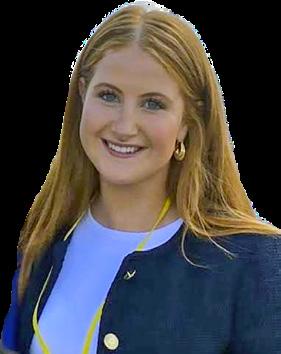

Yvette D’Arcy, BSc Economics & Finance
"I participated in the 2024 London Finance and Consulting Trip, which was an incredibly valuable experience. It gave me the opportunity to visit leading banking and consulting firms and gain a clearer understanding of the wide range of career paths within these industries. Hearing directly from professionals across various roles helped broaden my perspective and identify where my interests and strengths align. Prior to the trip, we prepared with the UCD Careers Team, who provided practical advice on CVs and networking. This preparation helped me make the most of events like the UCD Alumni Evening, where I connected with former students now working in London.
Recruitment teams also shared useful insights into their hiring processes, including tips on CVs, cover letters, interviews,
assessment centres, and case studies - knowledge that has been extremely helpful for internship applications. Through the connections I made on the trip, along with the guidance from recruitment teams, I secured a Spring Week at J.P. Morgan. This experience gave me a deeper insight into the firm’s divisions and confirmed my interest in a career in Markets.
I particularly enjoyed the dynamic environment and the chance to engage with professionals across trading, sales, and research. Following the Spring Week, I was thrilled to receive an offer to return for a Summer Internship in Markets, which I’m very much looking forward to."


You can enhance your employability with an Internship. Read more at www.ucd.ie/careers
Internships are growing in popularity, and in the current recruitment market, employers not only look for a good degree from a top university but professional experience as well. Doing an internship will help you gain insights into a particular career path which may help you sharpen your career focus, and you’ll have the opportunity to develop your skills.

What can I expect from an internship?
An internship is a work placement offered by an organisation for a set period of time (usually 3 to 12 months). Doing an internship is a great opportunity for you to gain practical experience in an industry related to your field of study/ interest. During your internship you will be work shadowing and receiving on the job training, learning about the business environment, contributing to exciting and impactful projects, participating in team meetings and delivering presentations on your work.
What are the benefits of doing an internship?
The benefits of doing an internship are numerous, including:
• Gain industry knowledge and experience which you can’t get in text books.
• Get exposure to real world problems and work on solutions.
• Acquire new skills and experience that you can talk about at your next interview.
• Build your professional network of contacts.
Where do I find an internship?
Internships can be part of your programme/credit-bearing or shorter non-academic internships which generally take place during the Summer.
Summer internships generally start to be advertised in December/January. Coming along to the Careers Network Internships Fair on the 21st January is a great way to meet employers with Summer internship opportunities. You will find Summer internship opportunities advertised on MyCareer, gradireland, LinkedIn, and general jobs sites such as Irish jobs and Indeed.
The Quinn Undergraduate School of Business gives students on the Bachelor of Commerce, BSc Business, and BSc Economics & Finance degree programmes the opportunity to do a 9 to 12 month academic internship in stage 3 of their studies. For more information on this contact Claire Kingston, Internships Manager for the Quinn School of Business.
Internships Fair is on the 21st January.
"We have a great history of hiring UCD graduates/students at Grant Thornton. The graduates/students have really excelled in roles across all of our Service lines: Audit, Advisory, Tax, Financial Services Advisory, and Financial Accounting and Advisory Services.
It is evident they have gained excellent problem-solving skills during their studies which enables them to add value to Grant Thornton and our clients. We also value their creativity, interpersonal skills, and adaptability."
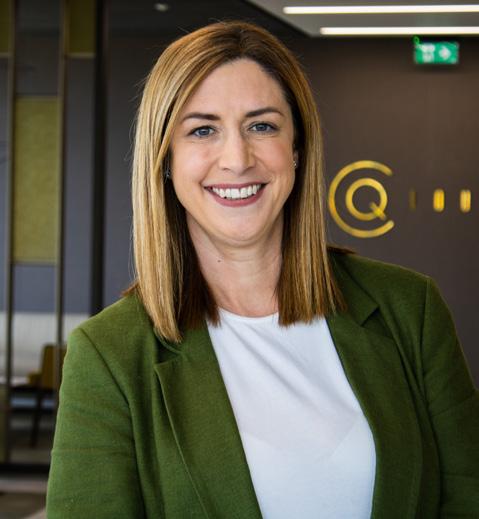

"I am a Commerce student at UCD and was the class rep and Business College Officer at the SU. My recent internship experience with Millennium began with an online assessment and interview process. After securing the role I was invited to London for the first week of their internship programme. There, I attended talks and networking events that offered valuable insights into the finance sector and global markets, and allowed me to connect with professionals from across the hedge fund industry. I also took part in a consulting competition with Deloitte and I&E Society, which provided hands-on experience working on real business cases and collaborating with industry experts.
At UCD, I’ve been involved in societies such as the Belfield Strategy Group Consulting Society. Through the 2 projects I was involved in, I’ve developed teamwork, communication, and project management skills by helping to organise competitions and participate in group projects. These experiences have given me a clearer understanding of finance and consulting, and I look forward to exploring these fields further. And additionally, I spent one semester abroad in Singapore, where I had the opportunity to meet like-minded exchange students and explore business perspectives outside of Ireland."

"As a Commerce student, my internship as a Sales Specialist Intern at Microsoft has been a transformative journey - one that sharpened my skills, expanded my network and shaped my career aspirations. When immersed in a fast-paced, innovative environment, I developed critical thinking, leadership and communication skills through real-world projects, customer engagements and cross-functional collaboration. From working with AI solutions to presenting to senior leaders and supporting clients across industries, I gained hands-on experience that complemented academic theory. Rotating across teams and collaborating with diverse stakeholders deepened my understanding of the tech landscape and the value of adaptability. Microsoft’s culture of continuous learning and inclusion empowered me to grow both professionally and personally. I earned certifications, volunteered for causes close to my heart and led communications campaigns for the Women at Microsoft communityexperiences that boosted my confidence and sense of purpose.
If you have the chance to do an internship during college - take it. It’s a unique opportunity to apply classroom knowledge, build your CV, and discover what excites you. For me, it’s been a launchpad into tech sales and a reminder that learning accelerates when you step into the world of work."

A graduate programme is a highly structured training programme, generally up to 2 years in duration, and may be rotational or non-rotational. A rotational programme consists of several rotations within different departments of an organization (for example Finance, HR, Sales, Marketing, Operations etc.), while in non-rotational programmes you remain within the same function. Getting a place on a graduate programme can be a stepping stone to a very successful career within that organization (or beyond).
Graduate programmes – Is it for me?
The employment market is strong and many large organisations, from Professional Services and Consultancy to the Banking, Retail, Tech and Food sectors, now offer graduate programmes. However, competition for places on these is high and many programmes are open to graduates across all academic disciplines so you are not just competing with your Business peers. Generally, to be considered for a place on a graduate programme, you need at minimum a 2.1 honours degree/GPA of 3.48 to 3.67, with some work experience and extracurricular activities to showcase your skills and strengths.
Where do I find a graduate programme?
Graduate programmes tend to start opening for applications in September and are often closed by December so you need to get cracking on applications quickly in trimester 1. Graduate programmes are advertised on MyCareer, gradireland, Linkedin, general jobs sites e.g. Indeed, and the Careers pages of individual organisations. Coming along to the Recruitment Fairs organised by the Careers Network in September and October allows you to meet with multiple employers and get a good sense of the types of graduate programmes on offer. You can find details of upcoming fairs, and register, on MyCareer.
It is important to read the job description carefully to see what skills and competencies the employer is seeking and tailor your application to match these as best you can. Examples of skills that employers look for when recruiting for graduate programmes include: communication, initiative, teamwork, problem solving, analytical thinking and emotional intelligence. Most employers use online, competency-based application forms which can take a bit of time and effort to complete so make sure you don’t leave it until the last minute. You may also be asked to submit a CV and cover letter. If you need help with an application make an appointment for a 1-2-1 consultation at the Careers Network via MyCareer.

Jen
Gallivan, Head of
Acquisition, Deloitte.
"At Deloitte, we seek graduates from all academic backgrounds to collaborate, explore and grow. Our people’s diverse perspectives allow us to solve real challenges in business and society. Our graduate programme inspires and energises students while developing their leadership skills early on. We are proud to hire from UCD and have been consistently impressed with its students. If you’re eager to learn, collaborate and grow, you’ll make an impact here."

"When I received the offer to join EY’s Assurance team as a summer intern, I felt a mixture of nerves and excitement. I’d heard about the fast-paced nature of the Big Four, but nothing compares to experiencing it firsthand. From day one, the onboarding process was welcoming and informative, helping ease the transition into professional life.
Since starting my internship, I’ve gained invaluable insight into the world of audit and professional services. Working alongside experienced professionals and supporting clients like Western Union and Midcap Financial has allowed me to develop technical skills through hands-on tasks such as reviewing financial statements and preparing audit documentation. Attending client meetings and contributing to team deliverables has deepened my understanding of the industry and improved my confidence in a corporate setting.
EY places strong emphasis on professional development and collaboration. The “buddy” system, where each intern is paired with a mentor, helped me settle in quickly and make the most of my experience. We also had the chance to attend masterclasses on topics like AI, sustainability, and Excel – all designed to enhance both hard and soft skills. What stands out most is EY’s commitment to building a positive, flexible work culture and investing in young professionals. Social events and networking opportunities with interns across Ireland have made the experience both enriching and enjoyable.
This internship has not only improved my technical capabilities but also built my confidence and shaped my career ambitions. I’d highly recommend it to anyone eager to grow in a supportive and dynamic environment. I’m excited for what’s ahead — including the chance to interview for a graduate position and hopefully continue my journey with EY."

"I have recently completed Stage 2 of the BSc Economics & Finance programme, and I believe that engaging with opportunities beyond just lectures has enriched my university experience thus far.
Joining the Student Ambassador Programme and the Quinn Community Forum has helped me garner transferable skills whilst giving me the chance to interact with peers from different courses and backgrounds. Joining the Investors & Entrepreneurs Society allowed me to get involved with I&E Woman in Business, and thus attend various discussion panels and networking events. Joining the Student Managed Fund as an equity research analyst gave me a lot of practical insight. Outside of more “finance-related” engagements, being a member of the Musical Society and the UCD Philharmonic Choir has helped me stay in touch with my creative side.
This course has also allowed for international exposure on various fronts. I visited a number of investment banking and consulting firms in London via the Quinn Finance & Consulting study trip and spent a full semester on exchange at the National University of Singapore. The former helped gain advice regarding career trajectories, and the latter exposed me to different cultures, learning styles and professional opportunities.
Next year, I will be joining Davy as a Capital Markets intern via the Quinn Internship Programme. Though the application process was intense, having my CV and cover letters reviewed by consultants from Careers Network made it less intimidating. I had also joined a Skills for Working Life workshop they organised back in first year and was able to bring in useful learnings.
My advice to current and prospective students would be to put yourself out there as much as possible. It may lead to numerous late-night coffees and a jam-packed Google calendar, but I definitely think that what you stand to gain makes it worth it!"

Each year the Careers Network organises a Corporate Finance Study Trip to London for undergraduate Business School students in their penultimate year. This week long trip gives participants the opportunity to find out what working life in London is really like and learn about opportunities in high profile organisations such as Morgan Stanley, JP Morgan, Goldman Sachs, Credit Suisse, Investec, Barclays etc. It’s also your chance to build your network of contacts in London.
The format of the visit to each employer can vary, but participants can generally expect:
• Employer presentations on different business areas and opportunities in each.
• Employee panel Q&A sessions – find out what it’s really like to work there!
• Office tours, for example to trading floors.
• Interactive skills workshops, trading games, case studies.
• Networking opportunites with UCD Alumni and senior management.
• Great application and interview tips from the recruiters who screen CVs!!
Students studying Business & Law (BBL) have the opportunity to participate in a Corporate Law study trip to London. The format is similar to the Corporate Finance trip, with participants visiting some of the world’s top Corporate and Commercial Law firms (the “Magic Circle” firms).
Keep an eye on your UCD email and MyCareer for upcoming information sessions on these study trips, as well as details of how to apply.
Here's what previous participants have to say about their experience:
"The highlight of my trip. Being able to talk to senior management was something that I really liked which the other employers didn't have. The panel Q&A was very insightful and I definitely learned the most from JP Morgan."
"I thought Barclays were excellent. The informal setting of the visit made it much easier to ask questions and the lack of PowerPoint made it feel less formal than the other firms. I also think that the speakers gave an excellent account of both the highs and lows of the reality of working in finance in London."
"As my first venture into Canary Wharf, Morgan Stanley provided us with valuable insights into the world of finance, especially with a focus on the sales and trading side. The manner in which the presenters used examples of their work really helped to illustrate their roles in a large investment bank."
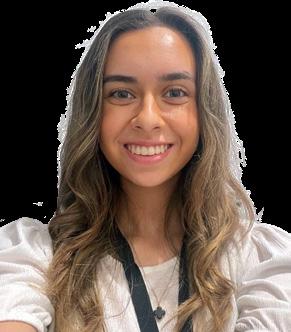
"I went on the UCD London Law Trip in third year. I’d previously participated in an insight scheme with DLA Piper (London office). I was also the brand ambassador for Freshfields at UCD. I was interested in understanding more about practicing law in London.
The trip enabled me to expand my network and connect with London-based trainees and qualified lawyers as well as understanding firms’ graduate recruitment process. Before the trip, we attended induction sessions focused on professional competencies including networking to get the most from the networking events organised by each firm.
We visited seven international law firms and had the opportunity to network, engage in negotiation competitions and attend workshops on legal and how deals work. We visited the Royal Courts of Justice and Francis Taylor Building Chambers, and attended a presentation and Q&A session with Mark O’Brien O’Reilly who gave us an insight into the barrister profession in London.
Additionally, we’d the chance to talk to UCD alumni at each firm. This gave me an insight into the possibilities of a successful legal career in London, as well as advice on tailoring my final-year module choices to align with the UK requirements.
This trip positively impacted my immediate and long-term career goals. It focused me on enhancing my commercial awareness skills as well as encouraging me to apply for further insight programmes and vacation schemes to develop my professional and legal skills London."


"The banking and consulting trip to London was an amazing opportunity for me as a stage 2 BSc Business student, offering me an invaluable glimpse into the competitive landscape of finance and consulting. The trip offered me the access to engage with alumni in the various firms and the broader Irish network in London, gaining first hand insights into various roles at different career stages.
These networking opportunities are crucial for the recruitment process at these large firms, especially in a competitive financial city such as London. As well, the presentations at the various firms gave me insight into the different positions, allowing me to identify where my skills profile was better aligned – allowing for more tailored applications.
Finally, the trip allowed me to meet various other students of diverse backgrounds whose academic and career interests align with mine."
I worked as a Risk Management Intern in a team of seven in the Risk Department of the largest aircraft leasing company in the world, Aercap, which manages 1,800 aircraft (+300 helicopters) around the world worth ~$70Bn. The role involved financial analysis, credit analysis, supporting the handling of distressed cases and portfolio management. The analytical, problem solving, and communication skills that I gained while studying in UCD Smurfit definitely contributed to a smoother and faster pace of integration into the working life at AerCap.
I was Class Ambassador for my group and also took part in the Global Leadership Programme (GLP). This really enhanced my employability skills. I would advise students to engage in social activities to make friends. I recommend the UCD Smurfit Careers Network to everyone that wants to grow and thrive in their own fields!

"I currently work as a Senior Associate Business Expert at Bank of Ireland. I work in the Home Buying transformation division as the first point of contact for all digital change requests. My role involves reviewing business needs, prioritising tickets, aligning them with customer journeys, and collaborating with technical teams to ensure solutions are effectively delivered.
Highlights:
One of the most valuable experiences during my time at UCD was working as a Careers Representative—a paid, part-time role that greatly boosted my communication, leadership, and event coordination skills. I helped organise Career Forums, as well as the opportunity to interview employers, and connect students with opportunities. These experiences gave me not only practical skills but also strong material for interviews and job applications.
Advice for Students:
My advice for students would be to make the most of UCD Careers—get involved in internships, volunteering, or part-time roles. These help you grow beyond academics and stand out in the job market.
If you’re a recent graduate, I highly recommend applying for a graduate programme—it gives you structured rotations and helps you discover where your strengths truly lie."

"I joined Expleo in January this year as a Project Coordinator and was assigned a project in the same week. The project involves Workforce Management Transformation and migration of data from existing to-be outdated system to a new system. My role in the project is to maintain the PMO data of the project in a PMO tool.
This involves updating RAID logs and Project Dashboards periodically to reflect the latest status, maintaining action trackers, leading weekly calls/meetings in various forums, assisting my project manager, infusing the project with an element of creativity by making innovative presentations, and being a central point of contact for the entire team for any kind of document templates or any other help.
Skills developed during degree:
Stakeholder management, Communications skills, RAID log mgmt, business negotiations and governance were some of the important skills that were developed during the masters course and are helpful today.
Highlights:
The most beneficial thing that happened to me during college was my internship in the Smurfit Careers department. I worked there for 6 months with a bunch of awesome people and the experience provided major growth in my practical skills and knowledge.
Advice for students:
Networking is magic! You won’t understand its importance during your course but when it comes to getting a job, networking is so helpful! So connect and get to know as many important industry people as you can. Learn to use LinkedIn effectively!"
The UCD Smurfit Careers Network team offers a holistic programme to support key points of students’ career development during their Postgraduate studies. The programme is structured into three key stages, each one of which has a distinct goal and structured actions to give students the tools to build and direct their own career.
The UCD Smurfit Graduate Business School expects graduate students to take the lead in their career development, supported by the best professional and academic support on campus. The goal of the integrated Graduate Career Development Programme is to help graduate business students develop themselves in three core areas over the course of the academic year.
1. As area specialist on their programme – building technical expertise and employability
2. As a generalist –building self-awareness, resilience and a career strategy
3. Identifying and achieving your first graduate career goal
STAGE 1 Getting Started: Set- Up for Success
Ensure you have a clear understanding of your role in your own career development as well as the information and support available from the UCD Careers Network.
• Introduction to Careers at Orientation
• Career Development Planning Workshop (CV, LinkedIn, Resilience, Competency, Career Development Planning)
STAGE 2 Building Career Skills and Professional Networks
STAGE 3 Success at Interview and Professional Brand Building
Provide you with skills workshops and networking opportunities that will enable you to build a career strategy and identify and compete for graduate positions.
• Recruitment Fairs
• Employer Presentations/ Employability Skills Workshops
• Self-Awareness, Personal Impact, Networking Workshops. Alumni Events
• One-to-one career sessions
Provide you with workshops that will support you in the interview and assessment process.
• Interview Workshops
• One-to-one career sessions
• Future Skills Programme (non-credit)


A career educationalist and more recently a Business and Executive Coach, Michael joined the UCD Michael Smurfit Graduate Career Development Centre as a Careers Manager in January 2016.
As a Careers Manager, his responsibilities primarily focus on;
• Implementation of the UCD Smurfit Business Masters professional development programmes as set out by the UCD Smurfit Career Development & Skills Centre.
• Delivering soft skills and employability workshops and seminars to complement academic learning.
• Providing one-to-one business & executive coaching for professional development.
• Liaising with employers to ensure they attract and retain highly effective employees.
Our MBA students come from a diverse range of sectors and professional backgrounds, all over the world, with a shared purpose of career development. MBA LEAP, our Leadership & Employability Advancement Programme, is an integral part of the MBA experience at Smurfit, providing students with a structured and competency based approach to Explore, Prepare and Execute their career strategy.
MBA LEAP incorporates career development seminars, industry insight sessions, an employability assessment centre, networking skills, alumni career panel
discussions, alumni career mentoring, employer mock interviews, company visits and presentations, and oneto-one career support.
UCD Smurfit School maintains strong industry links with national and global organisations. Our MBA graduates consistently secure employment in leading companies such as Microsoft, Google, Deloitte, KPMG, EY, Accenture, Workday, Amazon, Davy, Mainstream Renewable Power, Grant Thornton.
For more information please contact careers@ucd.ie
Are you considering doing a Masters or PhD after you have completed your undergraduate degree? If you want to specialise in a particular area then graduate study may be a requirement. Before taking the leap into graduate study, ask yourself these questions:
What is your motivation for graduate study?
What are the employment prospects for graduates from graduate study programmes?
What are the entry requirements for further study programmes?
UCD Careers Network is unique in Ireland as we have a dedicated Career and Skills Consultant for Graduate Research students.The service provides:
• Confidential 1-1 (60 minute) coaching/career guidance sessions, to discuss career options, job search, interview preparation
• 1-1 (30 minute) CV/Application review sessions
• Regular group workshops on applications, interviews and networking and more
• Bespoke delivery of workshops and seminars within Schools
• Alumni and employer networking opportunities
• Regular e-bulletin focusing on training and development opportunities and curated list of job vacancies
You can read about these services in more detail on the website.
As a Graduate Research student you have access to the Early Career Researcher pages on our career management platform MyCareer. MyCareer has a wide range of resources including interactive tools, such as AI CV review and interview prep, e-learning content and the latest job opportunities. MyCareer is where you can also book one-to-one appointments, workshops and events, and review resources such as recordings of all our Early Career Researcher alumni events. You can come and see us anytime, it is never too early to start thinking about your career. You can also avail of our 1-1 service up to two years post graduation.
Please click on the link to find out more about doing a PhD in UCD.

As the Graduate Research Student Career & Skills Consultant, Ms Tara Hughes focuses on the mobility and competitiveness of Research Masters and Doctoral Candidates beyond the PhD. She works with individuals and groups on planning how to find meaningful and rewarding careers. She does so by delivering a programme of professional skills training, 1-1 guidance and employer networking opportunities to enhance researcher competitiveness in a global environment.
In her previous role Tara worked as the Research Careers Manager (for Postdoctoral Staff & Research Fellows). Prior to that she was on the People and Organisation Development team in UCD HR developing programmes for Assistant Professors and new faculty. Her background is in Learning & Development, Organisation Development and as a HR Business Partner. She is a member of AHECS, AGCAS and the Association for Coaching. She is a UCD EDI Ambassador.


"Enel X is the global leader of demand response, and within Enel X I am part of the Energy Markets team. In my current role I coordinate and project manage the execution of demand response programs in Ireland. An important aspect of my role is serving as the primary point of contact for internal and external stakeholders including clients, the transmission system operator, and the regulatory authorities. In addition, I continuously monitor end-to-end processes to ensure compliance with program and market rules.
During my PhD I developed strong communication and presentation skills that are key to my current role. Moreover, I often rely on data analysis and critical thinking for strategic decisions. While doing academic research it is very easy to get stuck on tiny details, but it is important to remember the bigger picture: why are you researching this topic? Why is your research important? What difference can you make with your research? How can your research be used by others?"
UCD Careers Network
Library Building
University College Dublin Belfield, Dublin 4
Ireland
Tel: +353 (0)1 716 7574
Email: careers@ucd.ie

We are open Monday to Friday from 9am to 5pm.
You can find us on the corner of the James Joyce Library building; we have our own entrance next to the Campus Bookshop and opposite the main lake. The library building is no.34 on the Belfield Campus Map.

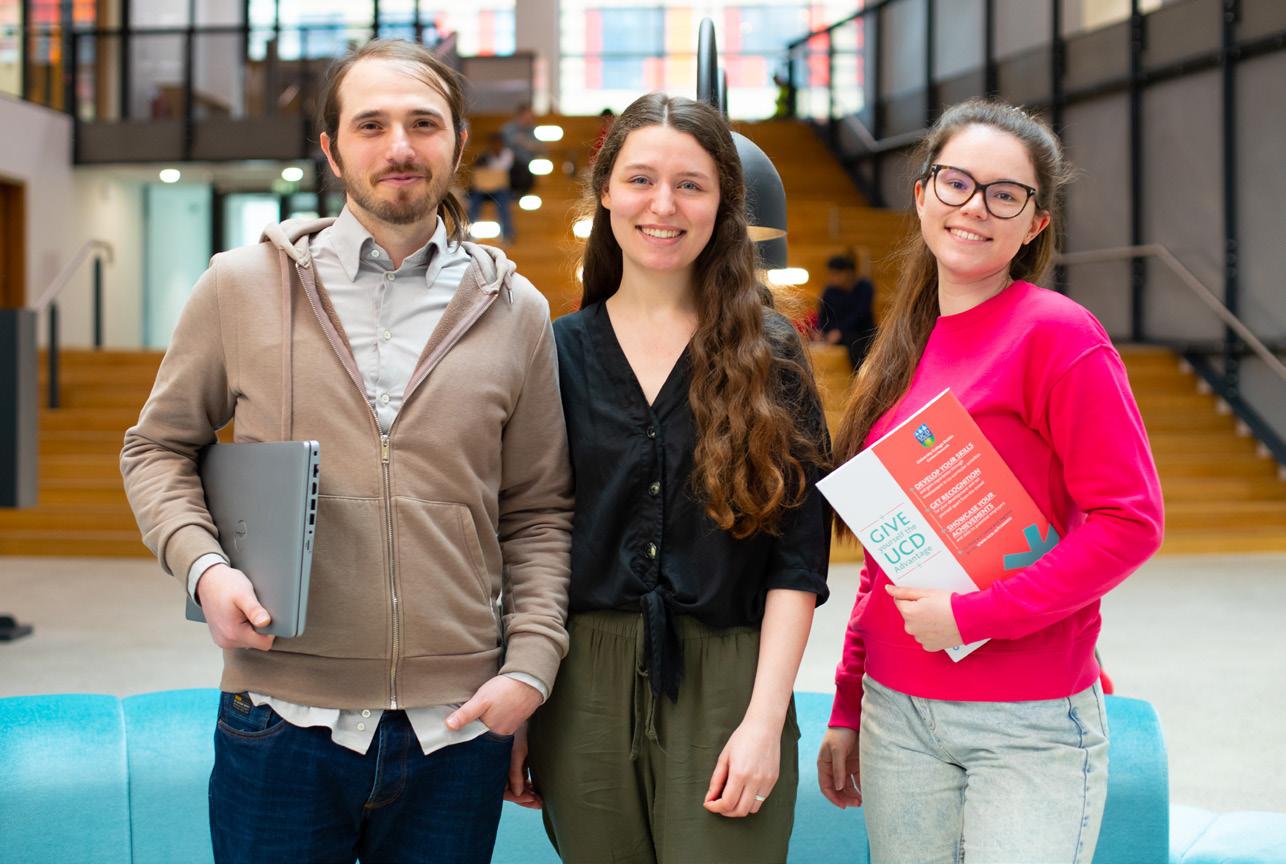
How employable do you think you are?
CareerEDGE+ is a personal development tool that should help you to identify possible areas for development over the next year.
1) Take the CareerEDGE+ profile quiz 2) View your personalised CareerEDGE+ report 3) Complete the allocated tasks in your report, to develop your employability
+ GET STARTED TODAY!
